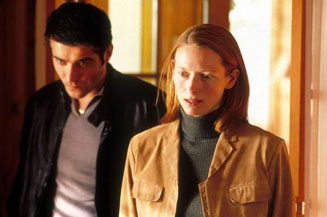Are You With Us?
The Deep End
By Ryan Mazie
March 28, 2011
BoxOfficeProphets.com

The Deep End is a drama first, then a thriller about a mother, Margaret Hall (Swinton), racing against the clock to cover up the murder of a sleazy gay club-owner, Darby Reese (Josh Lucas), she assumes her young son, Beau (Jonathan Tucker), committed. However, when a sex tape between Beau and Darby surfaces as a form of blackmail to be turned over to the police, Margaret not only has evidence to dispose of, but also has to raise $50,000 to pay off a Russian thug, Alek (Goran Visnjic), before the snooping investigators unveil the truth.
Like how you measure the speed of a car on a odometer, in this type of movie you usually meter the stakes by how much time is left for the protagonist to cover his or her tracks. In The Deep End, though, you judge the time left to the climax by how much sanity Margaret has left in the increasingly loopy plot.
When you stumble upon a body impaled by a ship’s anchor and suspect your son of murder, within the half-a-week-ish timeline of the film, wouldn’t you ask your son if he did it? I just couldn’t get over this illogical hump, especially because the character of Margaret is quite intelligent and emotionally connected to her children. I won’t spoil for you if the son committed the murder or not, but if you are expecting a wild plot twist from the lack of communication, then maybe this isn’t the movie for you.
While easy to write off for the multiple unnatural coincidental events that get the plot going, the strong acting and grounded dialogue make The Deep End worthy to check out.
Swinton dives into the juicy role of Margaret, balancing her day of driving her daughter to ballet and dragging a dead body into the middle of a lake with finesse; avoiding an easily laughable performance if the role went to an actress of lesser-caliber. Swinton also has a surprising amount of chemistry with the compassionate baddie-turned-good guy Alek, played by E.R. star Visnjic. In a lazily written role, Visnjic elevates the material, making the sudden change of heart easier to swallow, becoming likable to the audience for the final act of the film, reaching its full emotional impact.
Swinton and Visnjic truly own the movie, with the rest of the cast adding little more than plot contrivances. Jonathan Tucker is sulky as the son, surprisingly given very little to do. Lucas is impacting as the creepy Darby given only minutes of screen time. Raymond J. Barry, Alek’s crime boss, is a mere caricature, like Peter Donat as Margaret’s father-in-law, who is mainly waiting idly on the sidelines to provide brief moments of comic relief.
Director-writer duo David Siegel and Scott McGehee are stronger at directing than writing, with nice visuals. They deliver a well-paced thriller that grabs your attention and seldom loses its grip. Very loosely based off of the Elisabeth Sanxay Holding novel The Blank Wall (previously adapted as the 1949 James Mason-Joan Bennett starrer The Reckless Moment), the duo seem to be attempting more than just a thriller. Whatever that is exactly I am not quite sure, but at a perfect 101 minute running time, this suspenseful story with a heaping dose of drama succeeds at being an entertaining ride. With us for being exciting and with a theme that is always timely in Hollywood of a parent protecting their child even if it means a dead body (which might be even more popular today than ever before), I wouldn't be surprised if The Deep End resurfaced as a remake today.
Swinton’s last film before her career truly skyrocketed with the one-two punch of Vanilla Sky and Adaptation., The Deep End was a surprising hit by independent standards for Fox Searchlight, a company starting to find its stride.
Watching the trailer, I couldn’t help but think of another 2001 surprise thriller released almost exactly one month later, the underwhelming Don’t Say a Word. Pulling a bait-and-switch trick, showing off The Deep End as a fast-paced, flashy, bloody thriller, audiences and critics seemed to bite. Rated at 90% on Rottentomatoes among the Top Critics with stellar reviews creating some Oscar buzz for Swinton (it is good, but not that good), the public was willing to buy tickets and powered the total box office to $8.8 million ($12.5 million adjusted). Released August 10, 2001, the film didn’t make any box office dent until Labor Day weekend, where over the extended frame, it grossed almost $1.8 million in 326 theaters. Two weeks later, the film hit its top location count at 412. Doing well for a little thriller made on the cheap with a budget of $3 million, the film didn’t burn out until the last week of September when it had its first big fall – the same weekend Don’t Say a Word was released.
Nominated and winning some awards on the film festival circuit (almost all for Swinton), the biggest nomination The Deep End received was for Best Actress in a Drama at the Golden Globes (she lost out to Sissy Spacek for In the Bedroom although fellow nominee Halle Berry won the Oscar for Monster’s Ball in the end).
With a decent screenplay improved upon by terrific acting and better-than-needed directing, The Deep End turns a shallow opportunity for thrills into a much deeper and satisfying emotional adventure.
Verdict: With Us
7 out of 10